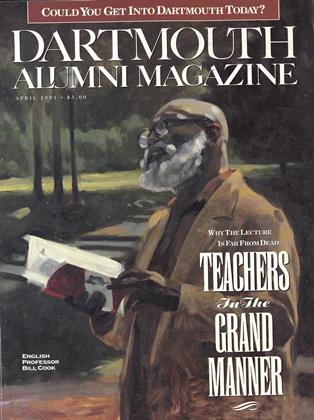1777
John Smith is promoted from tutor to faculty member. His title is "Professor of English, Latin, Greek, Hebrew, Chaldee, Etc."
1850
Students put their classical education to practical use by renaming the privy "the Temple of Cloacina" (Latin for "cleanse").
1870
The new Dartmouth curriculum allows two electives: French and calculus.
1876
The College stays the course as peer institutions move away from classicsbased curricula. "Why can't we do something first?" complains The Dartmouth's editor. "Must conservative Dartmouth always follow?"
1879
The Trustees establish the Latin Scientific Course. Students are permitted to substitute math, science, and modern languages for ancient Greek. Students are awarded a bachelor of literature degree.
1881
Interliners—booklets that provide line-by-line translations of ancient texts-are big sellers at the bookstore.
1900
Latin Sounds (Linguistics 10) is no longer offered.
1902
The Greek requirement for the A.B. degree is dropped.
1920
Richard Husband leaves the classics department and becomes Dartmouth's (and the nation's) first director of college personnel. Husband pioneers the use of psychological testing, vocational guidance, and psychotherapy.
1927
Professor of Greek Charles Darwin Adams retires. "His very name," writes historian Ralph Nading Hill '39, "happily or unhappily, depending on one's point of view, demonstrates the fact that the classics were being pushed out of the front pew by the sciences."
1989
The ancientnovel, in translation, makes an academic comeback. Classicists from around the world convene at Dartmouth to discuss such topics as "Erotic Narrative: Virginity and Going the Whole Hog" and "The Erotic Bath in Byzantine and Vernacular Romance."
Although the classics-based curriculumhas been plowed under, the College stillpays homage to it on mispecial occasions such as ground-breaking for the Hop
 View Full Issue
View Full Issue
More From This Issue
-
 Cover Story
Cover StoryTeachers in the Grand Manner
April 1991 By DEBORAH SCHUPACK '84 -
 Feature
FeatureA Recent Interview with Ernest Martin Hopkins' 01
April 1991 -
 Feature
FeatureHer Friend the Dalai Lama
April 1991 By Peter Bien -
 Feature
FeatureSTEVE KELLEY IN TWO ACTS
April 1991 By ROBERT ESHMAN '82 -
 Feature
FeatureCOULD I GET IN TODAY?
April 1991 -
 Feature
FeatureDisengagement
April 1991 By John Sloan Dickey '29







